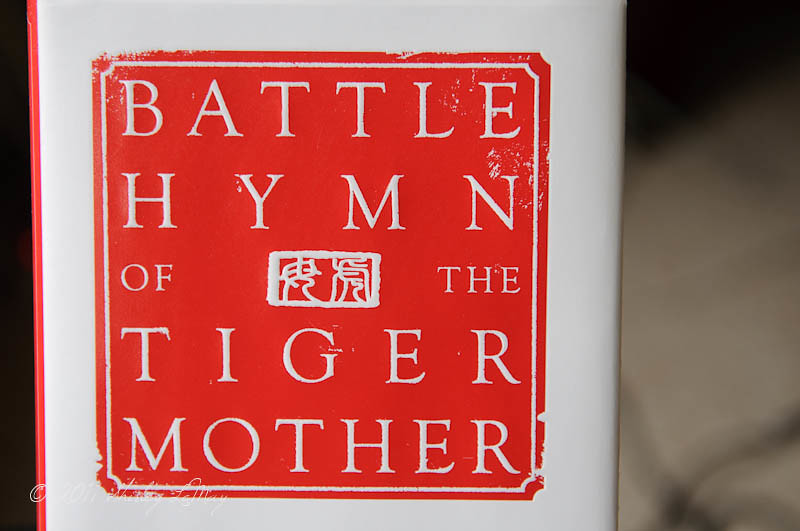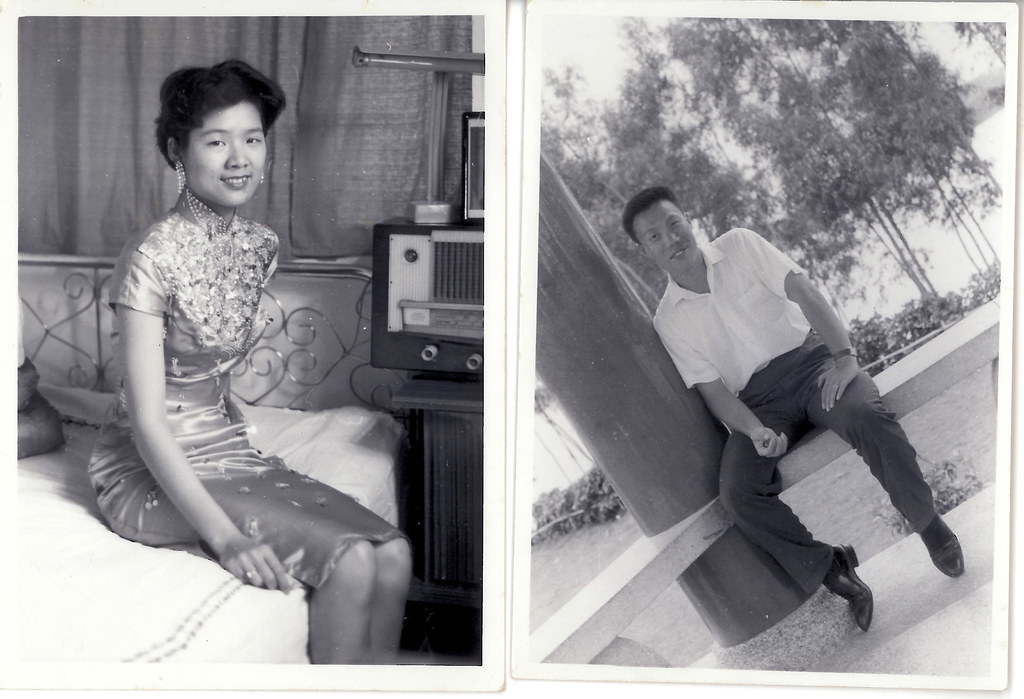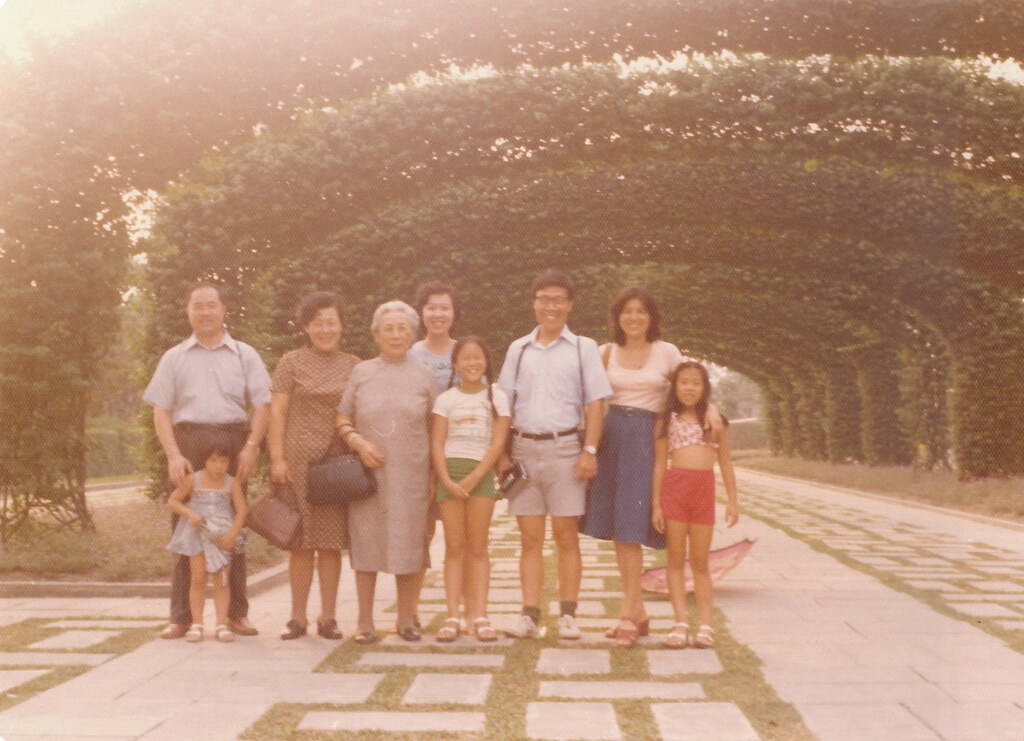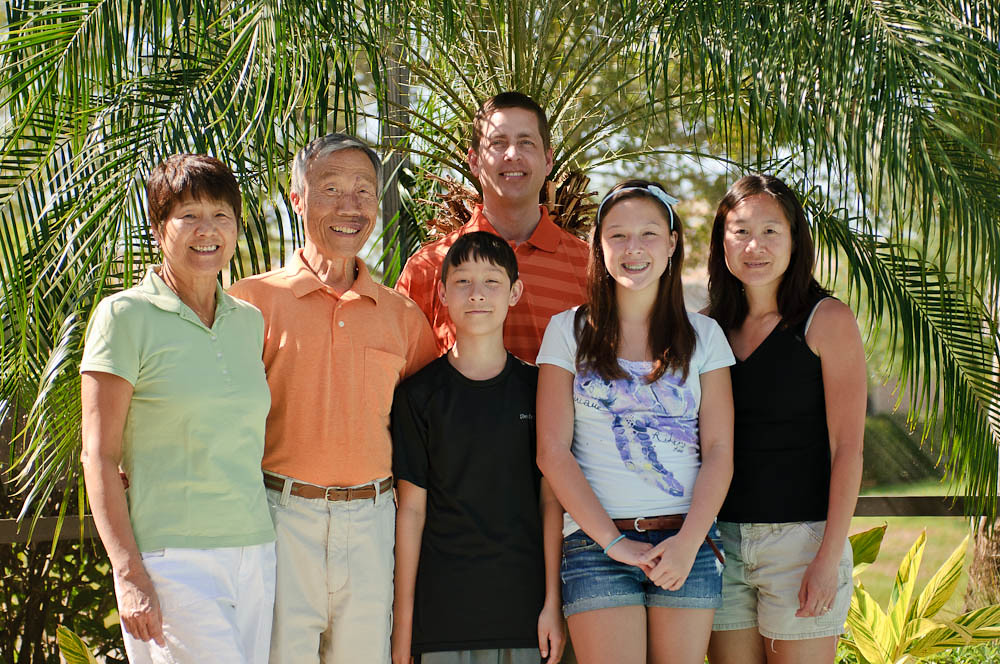
aka my thoughts on Amy Chua’s Battle Hymn of the Tiger Mother....
I read the book back in March, during Spring break. I started this blog post and never completed it. Since we are discussing the book tonight at Book Club, I thought it would be a good time to complete things. But please note that this is a very long post. To break things up, I am inserting "vintage" photos of my parents back in Taiwan and of our family growing up in Massachusetts.
When a carefully (controversial) excerpted version of Amy Chua’s Battle Hymn of the Tiger Mother appeared in the Wall Street Journal , provocatively titled “Why Chinese Mothers are Superior”, an uproar ensued, prompting opinions, harsh comments, opposition to the “Tiger Mother”, or Chinese method of parenting.
In the Wall Street Journal article, as well as the opening chapter of the book, the author lists the things she never allowed her two daughters, (two music prodigies) to do:
- Attend a sleepover
- Have a playdate
- Be in a school play
- Complain about not being in a school play
- Watch TV or play computer games
- Choose their own extracurricular activities
- Get any grade less than an A
- Not be the #1 student in every subject except gym and drama
- Play any instrument other than the piano or violin
- Not play the piano or violin
For me, it was also a reminder of some of my experiences growing up as a first generation Chinese in America – that these experiences were quite similar to that of Amy Chua’s, and in retrospect, quite funny.
The following is an excerpt from Chapter 5, Our Generational Decline, describing each generation of Chinese, fortunate enough to have come to the United States as graduate students (my parents). I’ve inserted my comments in italics.

My parents, around the time they were married....
The immigrant generation (like my parents) is the hardest working. Many will have started off in the United States almost penniless, but they will work nonstop until they become successful engineers (my father), scientists, doctors, academics, or businesspeople. [My parents ran a rustproofing business, co-owned and managed three Chinese restaurants while my father worked as an engineer at Digital. To this day, I don’t know how they did it all].
As parents, they will be extremely strict and rabidly thrifty. (“Don’t throw out those leftovers! Why are you using so much dishwashing liquid? You don’t need a beauty salon – I can cut your hair even nicer”.) [OMG! I even think these thoughts in my mind].
They will invest in real estate [My parents invested in three duplexes in the 80s and ran them as rental properties – just a little side business on top of the rustproofing and Chinese restaurants].
They will not drink much. Everything they do and earn will go toward their children’s education and future. [Yep – my parents worked so long and hard to give us all the opportunity they never had growing up in China and Taiwan. For that, I am forever grateful...]

Three Generations of the Chang Family - visiting Taiwan during the summer of 1976. I'm smack in the middle, next to my Grandmother (Nai Nai). From the Left - my Uncle and Auntie, baby sister Michele, Nai Nai, cousin Nancy, my Dad, Mom and sister Teresa.
The next generation (mine), the first to be born in America, will typically be high-achieving. They will usually play the piano and / or violin [Check on both instruments. I started playing violin in third grade. By fourth grade, I couldn’t wait to start playing piano, because all of my Chinese friends (sons and daughters of my parent’s friends) had been playing for years and I felt left behind. My younger sister, Teresa, also played violin for a couple years before switching to flute. All three of us Chang girls played piano for many years, my youngest sister, Michele, started playing when she was five.]

After a piano recital - I'm just about to apply the "rabbit ears" behind my sister, but Dad must have snapped the photo too soon. Note the matching shoes...
They will attend an Ivy League or Top Ten university. [Check for all three of us – but my youngest sister, Michele declined the opportunity to attend Cornell, opting to attend Reed College in Oregon instead – something my parents disagreed with... she was always the Rebel in our family...]
They will tend to be professionals – lawyers, doctors, bankers, television anchors [Another check]…
They will be less frugal than their parents [in some ways, yes, but I still use every drop of the liquid soap in the bottle, even diluting the remnants stuck to the sides of the bottle with water to make sure I get all the cleaning agents used up]. They will enjoy cocktails [and routinely drink wine with meals, just not special occasions].
If they are female, they will often marry a white person [Three girls, Three white husbands, even one from Scotland].
Whether male or female, they will not be as strict with their children as their parents were with them. [My kids wouldn’t agree with this statement!]

Another three generations
The next generation … will be born into the great comforts of the upper middle class. Even as children they will own many hardcover books [Erica had at least 10 hardcover Nancy Drew books that she read over the course of 10 days. We own the Harry Potter and Twilight series in hardcover. I don’t even want to talk about the Lego sets Brian owns – If Amy Chua had boys, she would have mentioned Legos for sure.]
They will have wealthy friends who get paid for B-pluses [And my daughter claims it’s unfair that I only pay her if she gets straight A’s – which is something my parents would never, ever do.]
They may or may not attend private schools, but they will expect expensive, brand name clothes [and force their mothers to shop at the Hollister and Abercrombie and Fitch, where they play music so loud you can’t even hear yourself think and spray that awful cologne everywhere. Seriously, I always end up with a head ache after shopping at the A and F. Not to mention the prices - $60 for a pair of jeans with holes in them. I insist my daughter pay for the overpriced clothes, and we always shop the sale rack.]
They will feel that they have individual rights … and therefore be much more likely to disobey. [The reality is that at some point in their lives, usually during adolescence, your children are likely to rebel. It’s a part of American culture, probably something instinctual in our human make up.]
end of excerpt
If asked, my children would claim that I am stricter than any of their friend’s mothers. I don’t let them watch certain TV shows – Sponge Bob, for example (because the characters treat each other disrespectfully). If they don’t get 100% on a test, I make them re-work their incorrect answers. If we sign up for an activity, we commit fully – no quitting. But I’ve made mistakes along the way – after all, there isn’t such a thing as “perfect parenting” - I did force my daughter to play violin for a year more than she wanted to and I applied a lot of pressure and negative reinforcement. I now realize that she isn’t a second generation version of me, that she has her own interests and should be allowed to pursue them on her terms (even if it means some struggling and bumps in the road to get there).
When applying to college, I wrote an essay on my uniqueness. I wish I had kept a copy of that essay, because it would be interesting to read what my 17 year old self had to say. It went along the ways of how I was a first generation Chinese, that I was subjected to all the Chinese ways of doing things. Yet, I was also in America, with its distinct culture, vastly different from my Chinese upbringing. I recognized I was a blend of these two cultures – the good and bad of each - and that the good and bad of each could be channeled to make me a better person. I find that still to be true – that the good things of the “Chinese way” (hard work and discipline) blended with the good things of the “American way” (freedom and acceptance) has given me so much opportunity.
As my kids grow older, I find that I need to let go of some of the restrictions I’ve imposed and start letting the kids make their own decisions and deal with the consequences. I let them watch Sponge Bob and the bratty kids on the Disney Channel. They know what I’d like them to watch instead, but it’s time for me to be less controlling. Because, in the end, our jobs as parents are to instill values of hard work, discipline, perseverance, truthfulness and independence in our children.
If you read this entire blog post, thank you! I hope I haven't bored you too much with my ramblings - I did enjoy the book and look forward to discussing it with my Book Club friends.
Shirley this was so interesting to read. Thank You for sharing!
ReplyDeleteThat was a fascinating read, Shirley. I am hoping to read Amy Chua's book at some point over the summer :) Thank you for your insight.
ReplyDeleteOh my goodness Shirley - the similarities between you and Amy Chua is eerie. I can appreciate and admire the work ethic. I wish I had half the energy but I guess Thais aren't as industrious:) Some people would say we're all the same anyway:) Though I don't agree with some of her parenting technique, I have no doubts that she loves her daughters and I love her writing style. Thank you for this! I have been meaning to write a review but I lent my book out and haven't seen it since:)
ReplyDeleteYou forgot to mention that both you and the author love to run. Now it's getting a little weird:) Should I be worried for your kids?
ReplyDeleteI've had this book on my to-read list for awhile. I have a Korean friend that I would like to understand better. She is of the immigrant generation and her kids are the next. I can see the parallels in your lives as well. She was in Boston (BU) at about the same time you were at MIT.
ReplyDelete